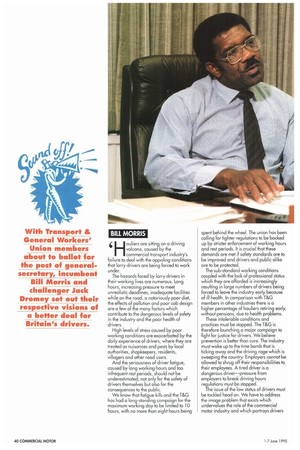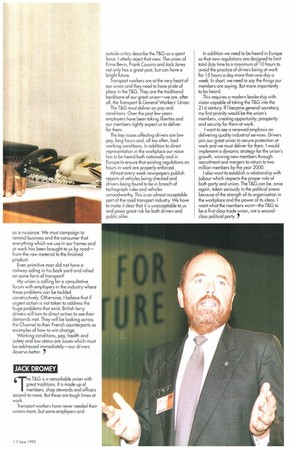.6 auliers are sitting on a driving volcano, caused by
Page 52

Page 53

If you've noticed an error in this article please click here to report it so we can fix it.
the commercial transport industry's failure to deal with the appaling conditions that lorry drivers are being forced to work under.
The hazards faced by lorry drivers in their working lives are numerous. Long hours, increasing pressure to meet unrealistic deadlines, inadequate facilities while on the road, a notoriously poor diet, the effects of pollution and poor cab design are a few of the many factors which contribute to the dangerous levels of safety in the industry and the poor health of drivers.
High levels of stress caused by poor working conditions are exacerbated by the daily experience of drivers, where they are treated as nuisances and pests by local authorities, shopkeepers, residents, villagers and other road users. And the seriousness of driver fatigue, caused by long working hours and too infrequent rest periods, should not be underestimated; not only for the safety of drivers themselves but also for the consequences to the public. We know that fatigue kills and the T&G has had a long-standing campaign for the maximum working day to be limited to 10 hours, with no more than eight hours being spent behind the wheel. The union has been calling for tighter regulations to be backed up by stricter enforcement of working hours and rest periods. It is crucial that these demands are met if safety standards are to be improved and drivers and public alike are to be protected. The sub.-standard working conditions coupled with the lack of professional status which they ore afforded is increasingly resulting in large numbers of drivers being forced to leave the industry early because of ll health. In comparison with T&G members in other industries there is a higher percentage of hauliers retiring early, without pensions, due to health problems. These intolerable conditions and practices must be stopped. The T&G is therefore launching a major campaign to fight for justice for drivers. We believe prevention is better than cure. The industry must wake up to the time bomb that is ticking away and the driving rage which is sweeping the country. Employers cannot be allowed to shrug off their responsibilities to their employees. A tired driver is a dangerous driver—pressure from employers to break driving hours regulations must be stopped. The issue of the low status of drivers must be tackled head on. We have to address the image problem that exists which undervalues the role of the commercial motor industry and which portrays drivers as a nuisance. We must campaign to remind business and the consumer that everything which we use in our homes and at work has been brought to us by road— from the raw material to the finished product. Even primitive man did not have a railway siding in his back yard and relied on some form of transport! My union is calling for a consultative forum with employers in the industry where these problems can be tackled constructively. Otherwise, I believe that if urgent action is not taken to address the huge problems that exist, British lorry drivers will turn to direct action to see their demands met. They will be looking across the Channel to their French counterparts as examples of how to win change. Working conditions, pay, health and safety and low status are issues which must be addressed immediately—our drivers deserve better. /
JACK DROMEY
6 he T&G is a remarkable union with T
great traditions. It is made up of members, shop stewards and officers second-to-none. But these are tough times at work.
Transport workers have never needed their unions more, but some employers and outside critics describe the T&G as a spent force. I utterly reject that view. The union of Ernie Bevin, Frank Cousins and Jack Jones not only has a great past, but can have a bright future. Transport workers are at the very heart of our union and they need to have pride of place in the T&G. They are the traditional backbone of our great union—we are, after all, the Transport & General Workers' Union. The T&G must deliver on pay and conditions. Over the past few years employers have been taking liberties and our members rightly expect us to deliver for them.
The key issues affecting drivers are low pay, long hours and, all too often, bad working conditions. In addition to direct representation in the workplace our voice has to be heard both nationally and in Europe to ensure that existing regulations on hours in work are properly enforced. Almost every week newspapers publish reports of vehicles being checked and drivers being found to be in breach of tachograph rules and vehicles unroadworthy. This is an almost acceptable part of the road transport industry. We have to make it clear that it is unacceptable to us and poses great risk for both drivers and public alike. In addition we need to be heard in Europe so that new regulations are designed to limit total duty time to a maximum of 10 hours to avoid the practice of drivers being at work For 15 hours a day more than one day a week. In short, we need to say the things our members are saying. But more importantly to be heard.
This requires a modern leadership with vision capable of taking the T&G into the 21st century. Ill became general-secretary, my first priority would be the union's members, creating opportunity, prosperity and security for them at work. I want to see a renewed emphasis on delivering quality industrial services. Drivers join our great union to secure protection at work and we must deliver for them. I would implement a dynamic strategy for the union's growth, winning new members through recruitment and mergers to return to two million members by the year 2000. I also want to establish a relationship with Labour which respects the proper role of both party and union. The T&G can be, once again, taken seriously in the political arena because of the strength of its organisation in the workplace and the power of its ideas. I want what the members want—the T&G to be a first-class trade union, not a secondclass political party. /








































































































